Existing User Log In
New User Registration
Register for a free account to gain full access to the VGChartz Network and join our thriving community.



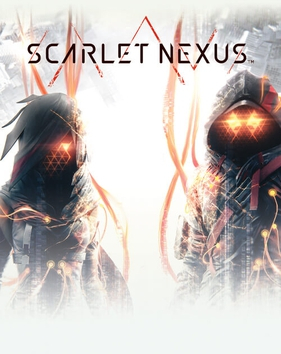

America - Front
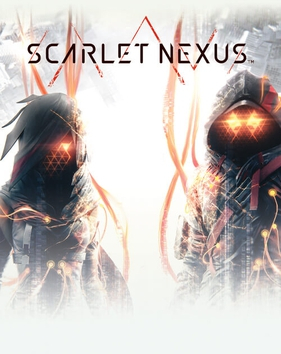

America - Back

The doldrums of summer are some of the roughest parts of the year for video game enthusiasts. The drought of major releases until the fall generally means having to settle for catching up on older titles, or even worse, going outside. Fortunately, Bandai Namco was kind enough to provide a new game that let me postpone that choice, namely Scarlet Nexus. But is it a worthwhile diversion from that inevitable decision?
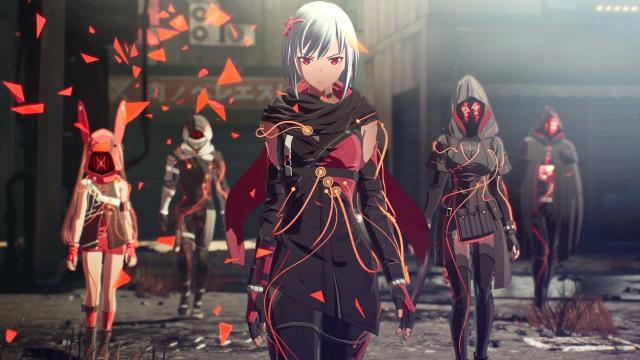
The premise of Scarlet Nexus isn’t an easy one to summarize. In the far distant future, humanity has discovered a specific hormone in human brains that allows them to access special psionic powers. At roughly the same time, a series of weird monster-esque figures called Others, who exclusively feed on human brains, appeared and began attacking people all across the planet. This led to the creation of psionic supersoldiers to fight the Others, because the best way to fight brain-eating monsters is with people who use their brains as weapons.
Scarlet Nexus advertises itself as equal parts action and RPG, but don’t let that fool you; this is a combat game first and foremost. The few RPG elements that do exist are ultimately pretty light. There are levels, but these don’t contribute much beyond experience points which unlock new abilities. That might sound pretty definitively “RPG-ish,” but these unlockable abilities don’t really end up letting you differentiate a character build and create a unique fighting style. Instead they mostly just allow you to do what you were already doing more efficiently, like adding bonus damage or extra attacks to your strings.
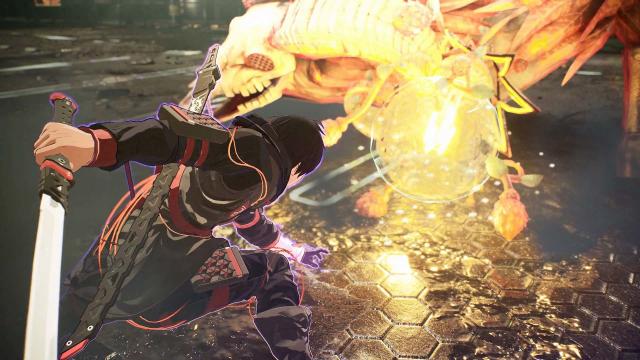
Gameplay itself is largely built into a segment chapter structure. Each chapter, or “phase” if you wish to be pretentious and indulge the game’s lingo, usually involves the player being sent through a semi-linear environment with a number of standard combat encounters before generally concluding with a boss fight of some sort. Navigating the terrain is usually pretty simplistic, with the greatest challenge on that front being occasionally asked to look around to find keys to open doors, meaning that, on the gameplay front at least, Scarlet Nexus isn’t offering a lot besides fighting.
Which brings us to the combat itself and, by necessity, the game’s two main playable characters: Yuito and Kasane. Yuito plays like a more traditional hack and slash character, specializing in fast, close-range attacks, requiring the player to carefully watch the enemy and dodge when they see an attack incoming. Conversely, Kasane has an emphasis on projectile attacks and prefers to fight at more of a mid range, which is good because she is an absolute drama queen and insists on posing for what seems like an eternity at the end of half of her attacks regardless of whether there’s a hungry monster in the immediate vicinity ready to chow down or not.
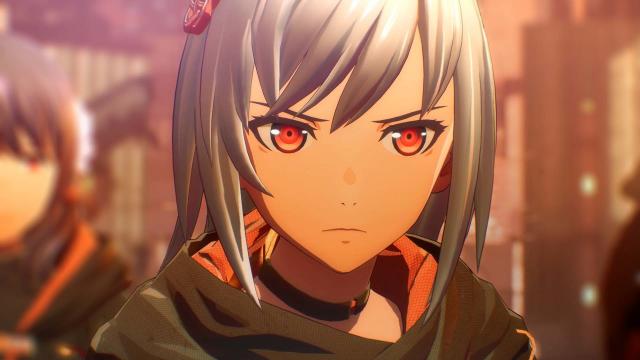
The core combat with Yuito and Kasane predominantly focuses around building combos and circumnavigating the restrictions the game builds into the combat system. Both Yuito and Kasane start out only being able to do three consecutive light attacks and one heavy attack per string, so to maximize damage it’s best to perform two light attacks, use a heavy, and then go into a full light string. This is simple at first, but gets more complex when you unlock more attacks, such as additional heavy attacks per string, a launcher, and a ground pound, and it all adds a nice bit of variety to proceedings.
The other side of combat builds into the psionic theme of the game. Both Yuito and Kasane possess the ability to move objects with their minds, and so scattered around each battlefield are a bevvy of objects that can be tossed at enemies like makeshift projectiles. You can just run around the arena hurling various rocks and discarded trash at enemies like a drunk Premier League fan, but these objects become more effective at dealing damage if you work them into combos. Doing so can leave you vulnerable, though, so combat becomes a risk/reward game of attempting to stun enemies with standard light and heavy attacks for long enough to work a tossed object into your combo. It blends pretty nicely together.
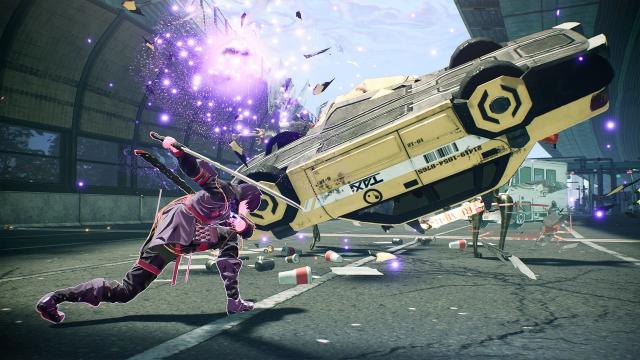
But these are all just the powers at Yuito and Kasane’s fingertips, and the game isn’t satisfied with only them. Most of the time, Yuito and Kasane will be accompanied on their various missions by teammates, who also have psionic powers, although the word “psionic” is getting stretched so hard that it ceases to mean much. Your teammates' powers include fire, lightning, invisibility, teleportation, invincibility, and more, and you can temporarily tap into one of their powers at any given time to augment your attacks or abilities. This had the potential to lead to all sorts of interesting strategies on the fly, like using fire to ignite an enemy covered in oil, or lightning to shock a water based enemy.
I say potential, because unfortunately Scarlet Nexus isn’t a game that places much trust in its players, and a lot of the potential the game possessed for having the player discover interesting combinations on the fly dissipates because it won’t stop telling you what to do. If the player had the chance to, for example, survey the battlefield, notice a water tower, and then make the connection that they should use it to douse an enemy and then electrocute them, that would likely have been immensely satisfying. But the game undermines this by routinely telling players what to do before they can figure it out, even going so far as to repeatedly point out strategies against regular enemies you’ve beaten dozens of times before. The development team packed a lot of cool features into the combat, but it seems like they were so scared that players would miss out on them that they ruin much of the chance for players to be clever on their own.
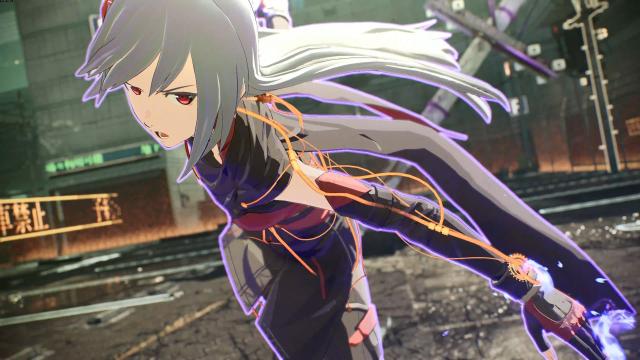
Between combat segments, Scarlet Nexus relies very heavily on cut scenes to build out its narrative, which has some grand aspirations. At the start of the game you’ll pick whether to play as Yuito or Kasane, both of whom have independent, fully fleshed-out storylines. Regardless of who you pick, the game addresses a number of very relevant and interesting themes, such as government surveillance, when loyalty to country becomes morally wrong, and conflicting ideals about how to reform authority structures.
Unfortunately, these themes never really get the attention they deserve. Scarlet Nexus just can’t seem to settle down and pick a couple of major points to focus on, and instead introduces new plot points and jumps from one sudden major revelation to the next without ever giving the narrative room to really build on anything. For instance, Yuito’s story goes from just starting out in the army, to questions about how to uphold a family legacy, to an insane Metal Gear Rising-esque bit about brain snatching, to a more somber reflection on how to act in a conflict when all sides are seemingly morally wrong, and then a couple of plot twists that feel like they were taken out of Nier Automata’s second act. And this is all before we’ve even hit the ten hour mark of gameplay.
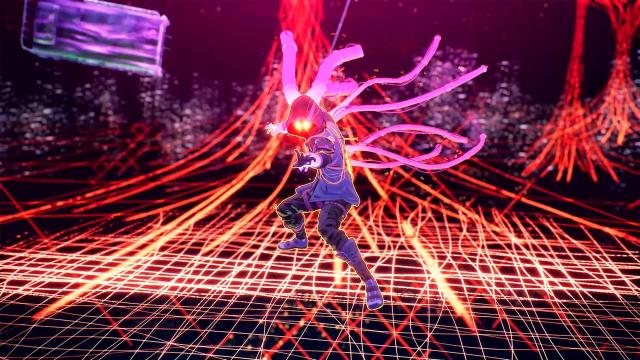
None of these are bad elements in and of themselves, but they’re all packed in so tightly that none of them have room to sufficiently develop. And it’s a shame, because what I would argue are the most interesting and societally relevant questions suffer the worst from this, with the story elements about ethical dilemmas and the limits of patriotism being largely brushed aside for the latter half of the story. There's this bit involving Yuito's team attempting to expose corrupt government actions which results in the population's trust beginning to waver and a prospective uprising, which then promptly gets basically forgotten about and ignored for the rest of the game's run time.
The characters are thankfully pretty well written and tend to carry the narrative. They’re unique, most of them have a good amount of depth, and most importantly they’re interesting to watch. The people not directly involved in your party do tend to lack a bit for screen time, and some of the villains’ motivations come off as simultaneously very under-explored and absolutely preposterous, but overall the characters, especially the main cast, did a good job of keeping me invested.
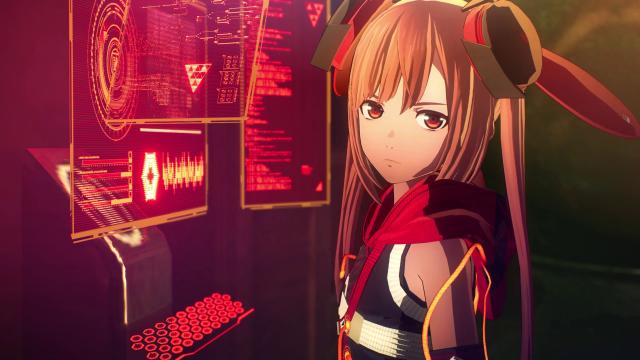
Another, more directly connected to gameplay activity is the bonding sequences. These work similarly to supports in Yakuza: Like a Dragon. After spending enough time fighting with a side character, you can go up to them between combat segments and initiate a brief set of dialogue. These can range from genuinely very well-written and interesting to just a group of dialogues where Yuito is completely oblivious to a series of young women who all want to be romantically involved with him. They're a bit hit or miss, but ultimately not unwelcome and do a good bit to flesh out the party.
But while the main cast can carry the narrative past its holes, and you can potentially overlook the game’s leanings towards over-tutorializing everything, less easy to gloss over is the fact that Scarlet Nexus’ combat, while initially good, just isn’t fleshed out enough to carry the entire game by itself. After eight or so hours of fighting many of the same, recycled enemies, and watching the same object throwing animations, things start to get tedious. And this is a real problem, because there’s about eight more hours to go... to complete one of the stories. If you want to complete both, you’re looking at an extra sixteen hours on top of that.
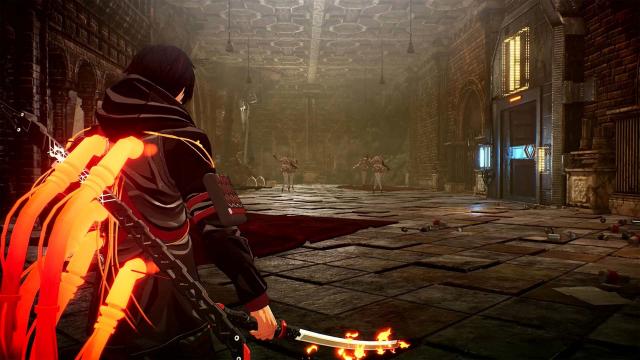
Granted, you’ll have a different character to play as for the second route, one with a reasonably distinct fighting style too, but it only takes so long for them to start feeling like treading old ground as well. While there is a moderate amount of variety to Yuito and Kasane’s kits as they stand (enough to make the combat compelling in maybe a standard action/adventure title), there needed to be more for the combat to be able to single handedly carry the entire game. Games that have in the past relied almost exclusively on hack and slash combat (Devil May Cry, Bayonetta, etc.) usually have incredibly varied, and perhaps more to the point complex systems that keep the player learning new things up until the very end, and often even beyond to subsequent playthroughs. Each of the characters in Scarlet Nexus, conversely, runs out of new tricks to show about halfway through their respective routes, and it’s not long after that that the combat begins to feel stale.
Admittedly you can alleviate this to an extent by only opting to play either Yuito’s or Kasane’s route, but doing so will leave you missing a substantial chunk of the story. Ultimately this results in a similar dilemma to Fire Emblem: Three Houses, another game with split paths, where you either miss out on a substantial chunk of the story or slog through a lot of samey gameplay just to get closure. I’m beginning to wonder if this split route idea is ultimately player friendly, as it seems to just require a lot of needless grinding for the same effect. All in all, I strongly suspect that Scarlet Nexus would have been a much better experience if they had just picked one character, made a single route for them that encompassed every major story element, and used the freed up development time to focus on fleshing out that character’s battle system.
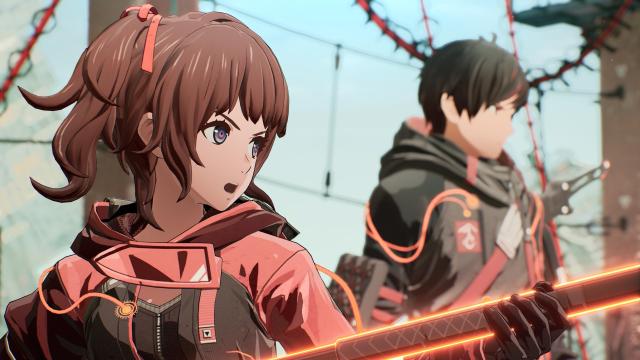
As a last point, I do feel the need to touch on Scarlet Nexus’ aesthetics, because they are absolutely beautiful. This is one of the prettiest games I’ve seen in a while; the blend of cyberpunk and anime-style techno coloring is gorgeous, and the visual effects in combat are exceptionally well animated. Enemy design also deserves praise for being simultaneously curiosity-inducing and disgusting. At the very least, this aesthetic is one I’d like to see much more of, especially given that so many combat games have struggled to create appealing level design.
So in the end, how good is Scarlet Nexus? Despite its shortcomings, it’s a game that I wanted to play through until the end... of one of the routes, and eventually slog through the second. If you’re a fan of combat games with some RPG elements, this is probably a solid bet. There’s enough that Scarlet Nexus does right to make it appealing for fans of the genre, and even if its failings are frustrating, I can appreciate it as a game that tries new things and attempts to set itself apart. I can confidently say that Scarlet Nexus is, overall, a good experience, thanks to some interesting combat design and well thought out characters, although its limited gameplay reach and muddled story mean that it’s hard for me to praise it beyond that.









